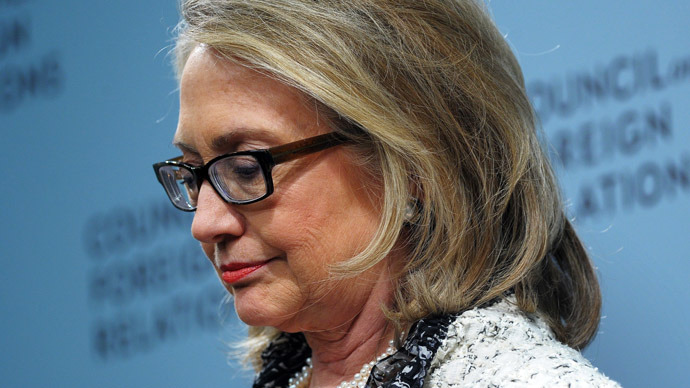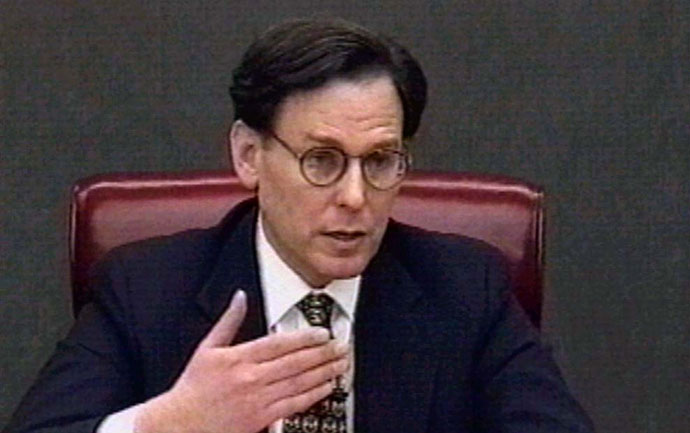Guccifer releases second trove of Clinton emails

The hacker that has targeted Hillary Clinton and the Presidents Bush has leaked a new trove of classified emails to RT that discuss in detail the Algerian hostage crisis and the relationship between the United States and Egyptian governments.
An elusive hacker using the moniker Guccifer was credited earlier this week with infiltrating the email account of journalist Sidney Blumenthal and uncovering a collection of highly sensitive memos allegedly sent to former Secretary of State Hillary Clinton. Now for the second time in only a week, the person known only by a three-syllable screen name has provided yet another compilation of correspondence that highlights America’s foreign diplomacy in ways that are rarely made public this side of WikiLeaks.
The first collection of correspondence, published by RT earlier this week, is believed to contain classified emails regarding last year’s terrorist attack in Benghazi, Libya and shined a significant light on an event that, although culminating in the death of four Americans, remains relatively obscured from major discourse six months later. In the emails obtained by RT on Friday, though, Guccifer relays memos alleged to have been sent from Blumenthal to Sec. Clinton that dive into matters regarding the January 2013 Algerian hostage crisis that left three Americans dead, as well as info about the inner workings of Egyptian President Mohamed Morsi’s office.

Blumenthal, 64, has neither confirmed nor denied the authenticity of the emails, and his son, journalist Max Blumenthal, told RT that his father would not comment on the leak. AOL, however, has admitted that the former White House aide’s account was indeed compromised. As with the correspondence detailing the Benghazi attack, though, the latest intelligence leaked to RT could prove to be quite substantial if and when their authenticity can be verified. And given Blumenthal’s relationship with Washington’s elite — he served as an aid during the administration of the secretary’s husband, former-US President Bill Clinton — the likelihood that the emails prove to be legitimate is not all that unlikely.
The four emails received by RT on Friday are all believed to be sent from Blumenthal to Clinton from his since-compromised AOL account and include correspondence dated December 8, 2012, January 18, 2013 and March 3, 2013. A fourth email, undated, discusses the June 2012 election of Egypt’s Pres. Morsi and is annotated as originating “from an extremely sensitive source” and should be “handled with care.”
Cooperation in Egypt
In the undated email, senior intelligence sources explain how the newly elected Egyptian leader plans to interact with the White House during his administration and details other strategies considered during the first days of Pres. Morsi’s term. Although the Egyptian election went to Morsi, a member of the Muslim Brotherhood, the emails suggest that his office intended to work with the state’s military, the Supreme Council of the Armed Forces (SCAF), which governed the country from former-President Hosni Mubarak’s departure in Feb 2011 up until Morsi was elected that June. In particular, Morsi’s officials agreed that cooperation with SCAF leaders, Field Marshal Mohamed Hussein Tantawi, would be imperative during the early days of the then-infant presidency.
“The SCAF officers reiterated their previous position that Tantawi and the SCAF do not want to rule the country, but they will not tolerate any move that limits either their budget or their position of respect in society,” the email reads in part. Later on, the source claims that both the Muslim Brotherhood and SCAF leadership agree “that their first order of business together in the new Egyptian political situation will be developing a coherent police towards Israel,” which would be done by“maintaining the Peace Treaty with Israel while limiting joint activity and cooperation on sensitive security matters.” To do as much, the source says Egypt desired more solid ties with the US and other allied nations. Elsewhere, though, the source says that a relationship with the West could mean connecting Egypt’s economy more seriously with those in the West.
Both Morsi and Muslim Brotherhood colleague Mohammed Badie “are firmly committed to a dual Islamic/Western banking system and good relations with Western firms,” another section of the email reads. “[Pres. Morsi] regularly states that the West has dealt with Saudi Arabia for many years, and the system he anticipates for Egypt will be far less restrictive than the one put in place by the Saudi rules. Badie also believes the fact that Morsi was educated in the United States and has many good contacts in that country.”
The fall of Morsi and help from America
In the second memo, dated Dec. 8, 2012, secret intelligent sources say that Morsi was already confident with his party’s impact on Egypt’s government, even if public opinion was still split. “Morsi added that although the ongoing demonstrations against his declaration of emergency powers will continue, and, if anything, become more violent, he firmly believes that at least 60 percent of Egyptian voters continue to support his efforts to eliminate the last vestiges of the regime of former president Hosni Mubarak,” it reads.
“According to a sensitive source, Badie and the leadership of the [Muslim Brotherhood] believe they are on the verge of reaching the goal of their 85 year campaign to gain control of the Egyptian government,” the memo goes on to state. In a separate email dated March 13 of this year, though, Pres. Morsi’s time in office is reflected as one that continues to be marred with not just disapproval but demands for American aid.
As early as three weeks ago, Badie told sources that “while ongoing unrest in the country is worrisome,” a Morsi presidency would be likely for another year. In order to counter the stagnant level of unrest, the source said Morsi was working to develop policies that would allow for a $4.8 billion loan package from the International Monetary Fund, which Badie predicted will lead to the US lending another $1 billion.
“[Badie] added that [Morsi] interpreted [US Secretary of State John Kerry’s] statements following his recent visit to Cairo as indications that the US government recognizes that the Morsi regime is working in good faith to reach an agreement with the IMF, and that this course offers the best chance for stability in Egypt. According to this source, Morsi recognizes that the US expects him to take steps to strengthen the economy and build political unity. He was particularly pleased to learn that the US will released $190 million of the initial $450 million portion of the US pledge. Badie added that Morsi felt that he and his team had convinced the US delegation that these funds were needed to allow planned reforms to go forward, and that the various opposition leaders do not offer credible alternative solutions.”

Algeria’s arrangement with terrorists
But perhaps the most significant of the leaked memos is one from January 18 of this year, roughly two days after al-Qaeda linked terrorists operating under the since-slain Mokhtar Belmokhtar took over 800 people hostage at a gas facility near In Amenas, Algeria. By the time the stand-off ended on January 19, 39 foreign hostages were killed, including three Americans. But according to “a very sensitive source,” an informal relationship between the Algerian government and known militants was expected to have thwarted such a situation.
The source, speaking privately, claims that Algerian President
Abdelaziz Bouteflika “was surprised and disoriented with the
attacks” because his government “reached a highly secret understanding with
Belmokhtar” a year earlier. “Under the agreement Belmokhtar concentrated
his operations in Mali, and occasionally, with the encourage of the
Algerian Direction Générale de la Sécurité Extérieure, attack
Moroccan interests in Western Sahara, where the Algerians have
territorial claims. The Algerian security officials fear that
January 17 attacks might mark a resumption of the 20 year civil war
and resolved to deal with the situation with extreme
force.”
“According to these sources, the
fate of the hostages is a secondary consideration in this
decision.”
From an unknown sender
As with memos obtained by Guccifer and provided to the media earlier, the hacker apparently attempts to cover his tracks by cloning the original documents and saving the text in an alternate format. Once again with these emails, Guccifer appears to have copied the text of the original memos, and then placed them in a text file — after changing the font to Comic Sans — where the final image was saved as a picture file.
Since that breach, Guccifer has published at least eight incredibly sensitive emails, including the trove from earlier this week that linked the Algerian hostage crisis to the death of US Ambassador Chris Stevens and three other Americans in Benghazi last September. In those emails, intelligence sources said that al-Qaeda in the Islamic Maghreb funded Mokhtar Belmokhtar, and that with that money Islamic militants likely afforded both the Benghazi and Algerian incidents.
But perhaps as an attempt to back-up his alleged hack, Guccifer has also this time included a series of other documents — namely screenshots from within Blumenthal’s inbox and an image of US Gen. Colin Powell and other men posing for a photograph.
The screenshots supplied to RT, included correspondence involving Blumenthal, Sec. Clinton, a former CIA agent and an attorney and journalist. Attempts to have those sources verify the emails have gone unanswered as well.

Guccifer has previously been credited with hacking Gen. Powell’s
Facebook and the email account of former President George W. Bush’s
sister, in turn leaking a number of oil paintings purported to have
been done by the president. The Secret Service has since claimed to
be investigating
the breach.















